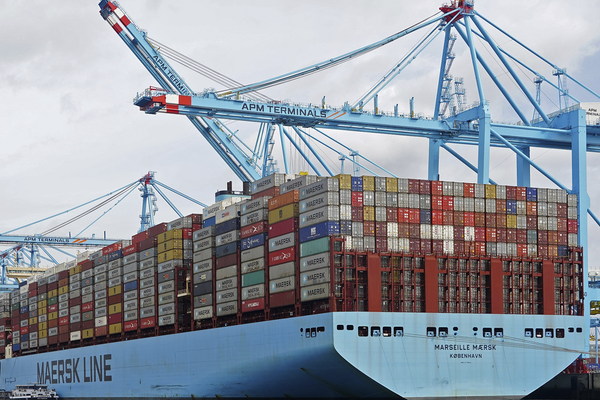Do Sanctions on Russia Portend a Return to the Interwar Order of Trade Blocs?

The sanctions levied against Russia in reaction to its war against Ukraine represent, along with the war itself, a striking break with the norms of the global order that have characterized the world since the late 1940s. Along with rising tensions between China and the United States, the sanctions may irredeemably weaken the economic foundations undergirding the global order. Were this to happen, what would the world be like? The collapse of economic globalization after World War I offers a sobering parallel to what might lie ahead.
The world before World War I was in some ways more globalized than it is today: migration, agricultural trade, and investment in public works all flowed more freely than they have since. Blockades, seizures of enemy property, and capital controls during the war made almost all countries’ economies less globalized. Trade walls and monetary instability left over from the war brought about long-term deglobalization during the Depression. Foreign investments dropped from 18 percent of world GDP in 1914 to only 5 percent in 1950. They only surpassed the level of 1914 in the 1980s.
As the world economy unraveled, leaders and activists proclaimed autarky, economic self-sufficiency, as a goal. Yet vital raw materials and export earnings were too crucial for any industrial economy to practice true autarky. Instead, economic blocs emerged. Britain tried to knit together its colonies, dominions, and trading partners into a “sterling bloc” surrounded by tariffs, the latter enshrined in what were known as the Ottawa agreements. Nazi Germany’s Grossraumwirtschaft and Japan’s Greater East Asian Co-Prosperity Sphere had deep roots in peacetime patterns of trade and investment before they became war plans.
None of these schemes could be justified in purely economic terms. Despite costly efforts to rely on domestic or imperial sources for raw materials, these economic blocs never truly succeeded. Nazi Germany’s largest supplier of raw materials on the eve of the Second World War was the United States, a country with which it contemplated going to war. Forty-five percent of all Japan’s imports came from the United States, against which it went to war in December 1941.
Nonetheless, nations continued to try to build economic blocs. World War I had demonstrated how vulnerable nations were if political forces moved against them. Blockades had helped defeat both Germany and Russia and nearly brought Britain to its knees. Diplomats supporting the League of Nations hoped that sanctions could replace war as a way to curb aggressors. In fact, the near success—but ultimate failure—of League sanctions against Italy for its war against Ethiopia in 1935-36 had the opposite effect. The sanctions helped convince German and Japanese leaders that they needed secure sources of supply and that war to acquire them would not be stopped by the League powers. As exiled German economist Moritz Bonn recognized in 1934, “international economic interdependence is a gamble.” Peace made it a wise choice. The threat of war could make it appear foolish.
Even though academic and business leaders in the 1930s warned that economic blocs often made little sense, a floodtide of agitation and propaganda helped convince people of the wisdom of autarky or self-sufficiency. Radio, newsreels, and air travel made people around the world more aware of events in foreign countries than ever before. Yet more news led to fear, not understanding. In 1936, U.S. Agriculture Secretary Henry Wallace pointed out why: “From the point of view of transportation and communication, the world is more nearly one than ever before. From the point of view of tariff walls, nationalist striving, and the like, the nations of the world are more separated than ever before.” Putin’s onslaught of lies about Ukraine has its counterparts in the propaganda that flowed from Berlin, Moscow, Rome, and Tokyo in the 1930s. Economic de-globalization and continued informational globalization, however skewed in its content, can happen simultaneously.
The contemporary global order began as an attempt by U.S. leaders during the 1940s to overcome economic blocs. What is striking is how long it took for the architecture of multilateral trade agreements and monetary stability to support globalization. As late as 1961, distinguished scholars of international affairs such as Karl Deutsch and Alexander Eckstein concluded that “In all probability, the world will not see again, in this respect, as in many others, the ‘normality’ of pre-1914.” Only in 1990s, with the reform era in China under Deng Xiaoping and the collapse of the Soviet bloc, did globalization surpass the levels of trade and investment that had been reached before World War I.
Will economic blocs and declining inter-dependence return? Centered primarily on western Europe, the world economy of the early twentieth century proved vulnerable to contraction. Today, East Asia, the EU, and North America all integrate economies across borders. The real test for the future will be whether China turns to building walls, not bridges. Dependent on exporting raw materials like oil, Russia could have a secure, though subordinate place in a Chinese-led economic bloc. China, despite its growing nationalism, remains more deeply enmeshed in the global economy than any country in the 1930s. In 2018, seventy percent of the countries in the world traded more with China than the U.S. Nonetheless, opposition to the global order led by the United States and its allies could tempt China’s leaders to turn away from the global economy and towards an economic bloc. The future may then look more like the past. A turn by China towards building an economic bloc in combination with Russia would be a momentous decision: difficult, drawn-out, dangerous, but not, in the light of history, out of the question. Politics can override purely economic calculations. They have in the past.